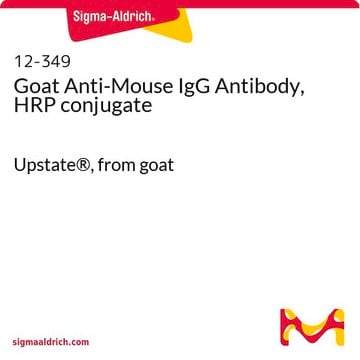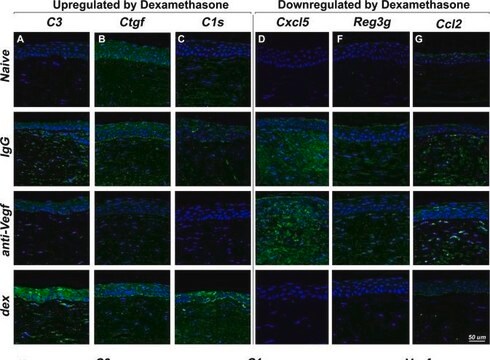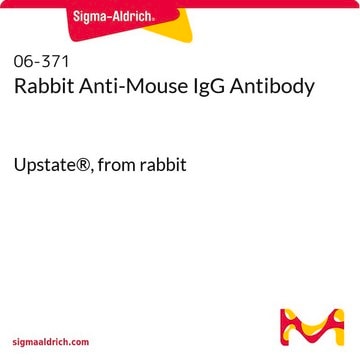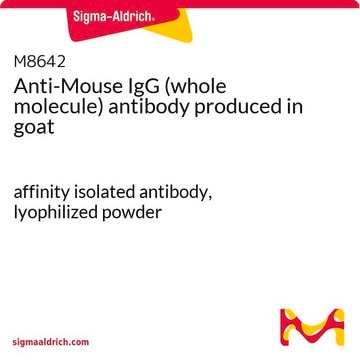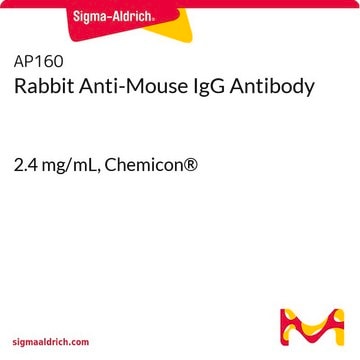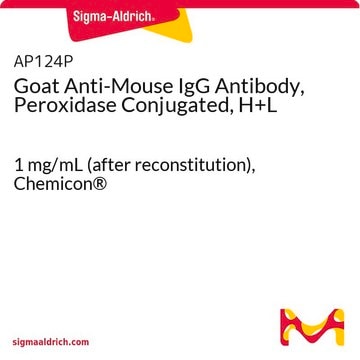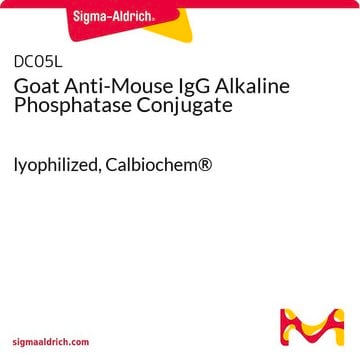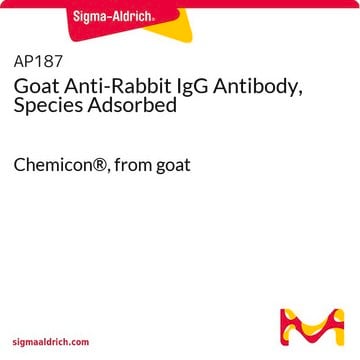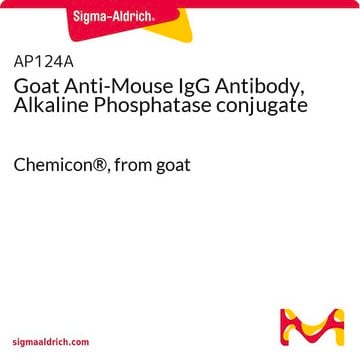AP124
Goat Anti-Mouse IgG Antibody
2 mg/mL, Chemicon®
Synonym(s):
Anti-Mouse IgG, HRP-Conjugated Goat Anti-Mouse IgG
Sign Into View Organizational & Contract Pricing
All Photos(1)
About This Item
UNSPSC Code:
12352203
eCl@ss:
32160702
NACRES:
NA.46
Recommended Products
biological source
goat
Quality Level
conjugate
unconjugated
antibody form
affinity purified immunoglobulin
clone
polyclonal
species reactivity
mouse
manufacturer/tradename
Chemicon®
concentration
2 mg/mL
technique(s)
ELISA: suitable
immunoprecipitation (IP): suitable
western blot: suitable
shipped in
wet ice
target post-translational modification
unmodified
Specificity
Reacts with Mouse IgG gamma chain, as well as the light chains from all mouse immunoglobulin classes.Monospecific on IEP against whole mouse serum.
Application
Goat anti-Mouse IgG Antibody detects level of Mouse IgG & has been published & validated for use in ELISA, IP & WB.
Quality
Single band on IEP at a concentration of 10 mg/mL when run against rabbit anti goat whole serum.
Physical form
Liquid in 0.02M Phosphate Buffer, 0.25M Sodium Chloride and 0.1% Sodium Azide. Filtered through a 0.45 micron membrane filter.
Storage and Stability
Store at +2-8°C in undiluted aliquots for up to six months.
Legal Information
CHEMICON is a registered trademark of Merck KGaA, Darmstadt, Germany
Storage Class Code
10 - Combustible liquids
WGK
WGK 2
Flash Point(F)
Not applicable
Flash Point(C)
Not applicable
Certificates of Analysis (COA)
Search for Certificates of Analysis (COA) by entering the products Lot/Batch Number. Lot and Batch Numbers can be found on a product’s label following the words ‘Lot’ or ‘Batch’.
Already Own This Product?
Find documentation for the products that you have recently purchased in the Document Library.
Customers Also Viewed
Jinghao Wang et al.
International journal of medical sciences, 18(1), 18-28 (2021-01-05)
Cardiac hypertrophy (CH) is a major risk factor for heart failure accompanied by maladaptive cardiac remodeling. The role and potential mechanism of neuropeptide Y (NPY) in CH are still unclear. We will explore the role and the mechanism of NPY
Kathleen M Lennon et al.
Journal of extracellular vesicles, 8(1), 1685634-1685634 (2019-11-20)
Biofluid-accessible extracellular vesicles (EVs) may represent a new means to improve the sensitivity and specificity of detecting disease. However, current methods to isolate EVs encounter challenges when they are used to select specific populations. Moreover, it has been difficult to
Chongwen Wang et al.
Sensors and actuators. B, Chemical, 345, 130372-130372 (2021-07-06)
Rapid and accurate diagnosis of severe acute respiratory syndrome coronavirus 2 (SARS-CoV-2) and influenza A virus (FluA) antigens in the early stages of virus infection is the key to control the epidemic spread. Here, we developed a two-channel fluorescent immunochromatographic
S Seo et al.
Neuroscience, 192, 28-36 (2011-07-23)
Agmatine, the decarboxylated metabolite of l-arginine, is considered to be a novel putative neurotransmitter. Recent studies have demonstrated that endogenous agmatine may directly participate in the processes of spatial learning and memory. Agmatine-immunoreactivity has been observed within synaptic terminals of
Nan Wang et al.
Oncology reports, 46(2) (2021-07-20)
Metastasis‑associated lung adenocarcinoma transcript 1 (MALAT1) is a long non‑coding RNA that is overexpressed in various human cancers, including breast cancer. Evidence has associated the function of the α‑2,8‑sialyltransferase (ST8SIA) family with breast cancer. The present study aimed to investigate
Our team of scientists has experience in all areas of research including Life Science, Material Science, Chemical Synthesis, Chromatography, Analytical and many others.
Contact Technical Service
